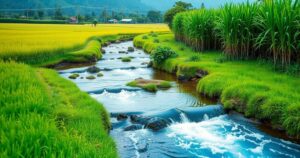Tanzanian Communities Tackle Climate Change Through Innovative Water Solutions and Sustainable Practices

In Tanzania’s Dodoma region, rural communities are increasingly affected by climate change, particularly through prolonged droughts. Initiatives led by the Tanzanian government and UNEP aim to alleviate these challenges by enhancing water accessibility, restoring ecosystems, and diversifying livelihoods for resilience against climate impacts. The project has benefited over 35,000 individuals and includes significant undertakings such as the establishment of boreholes, tree planting, and training in sustainable practices, underscoring a holistic approach to environmental and economic stability.
In the heart of Tanzania’s Dodoma region, the plight of rural communities facing the impacts of climate change has become increasingly evident, particularly as prolonged droughts threaten traditional livelihoods. Asherly William Hogo, a cattle farmer in his sixties, vividly recalls his childhood struggles to find water for his herd. However, a recent initiative providing solar-powered boreholes and rainwater reservoirs has transformed water accessibility for the villagers of Ng’ambi, alleviating the arduous journeys previously undertaken in search of water. “Now we don’t travel long distances like we used to,” Hogo remarks, highlighting the project’s positive impact on local life. This initiative, spearheaded by the Tanzanian government and the United Nations Environment Programme (UNEP) since 2018, is a response to escalating challenges posed by climate change, including severe droughts that have devastated crops and livestock. Mirey Atallah, Head of UNEP’s Adaptation and Resilience Branch, asserts, “This year is the biggest wakeup call we have seen in Tanzania in terms of what climate change is doing to rural families.” With continued climate volatility threatening the traditional farming practices upon which many families rely, the project encompasses community-driven land use planning—an essential strategy to combat potential climate doom spirals. UNEP’s efforts to enhance water supply systems have brought benefits to over 35,000 individuals across five districts, establishing both boreholes and earthen dams capable of capturing millions of cubic meters of rainwater. The initiative does not solely focus on water infrastructure; it emphasizes ecological rehabilitation and alternative livelihoods. By planting over 350,000 trees and providing training in sustainable income-generating activities, including beekeeping and mushroom cultivation, the program aims to build resilience against climate-induced economic shocks. Asnati Meshack from Simanjiro expresses, “Planting trees has restored our environment,” underscoring the vital interplay between environmental health and community economics. As the project approaches completion in late 2024, it anticipates an increase in income for approximately 3,800 households, an essential safety net against the unpredictability of climate change. Minister of State Selemani Jafo recently recognized the project’s success, affirmatively stating, “[This project] is empowering the people in a big way to build their economy.” Furthermore, the project encourages empowerment and gender equality within the community, providing training to women in fields traditionally reserved for men, as exemplified by May Samwel Masulu, who proudly embraces her role as a craftswoman building fuel-efficient brick stoves. Through initiatives like the Ecosystem-based Adaptation for Rural Resilience in Tanzania, the UNEP aims to support the goals of the Paris Agreement, striving to mitigate climate change through innovative and comprehensive strategies that enhance both environmental health and community resilience.
Tanzania, like many countries on the frontline of climate change, is witnessing significant alterations in its weather patterns, leading to severe droughts and erratic rainfall. These shifts have heavily impacted rural communities that depend on agriculture, raising urgent questions about sustainability and adaptation in the face of an unpredictable climate. The United Nations Environment Programme (UNEP) and the Tanzanian government have partnered since 2018 to implement solutions designed to enhance water access, facilitate sustainable livelihoods, and rehabilitate degraded ecosystems within these vulnerable communities, thereby addressing both immediate needs and long-term environmental challenges.
In summary, the efforts being made in Tanzania to combat the adverse effects of climate change through innovative strategies and community involvement demonstrate a critical commitment to enhancing resilience among rural populations. By focusing on water accessibility, ecological restoration, and alternative livelihoods, the initiative not only addresses the pressing challenges posed by climate change but also serves as a blueprint for other regions facing similar threats. Through continued collaboration and adaptive strategies, these communities can build a more sustainable future, empowered to withstand the uncertainties of their changing environment.
Original Source: www.unep.org








